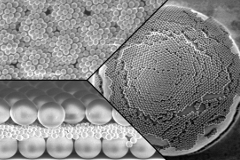Self-assembly
Project Description
Self-assembly of monodisperse colloidal particles readily leads to well-defined nanostructured materials. Such systems can be used to fabricate hierarchically structured hybrid materials or they can be used as templating mask, for instance for nanosphere lithography. A recent review highlights the current status of the field and provides a comprehensive overview on the complex nano- and mesostructure accessible by colloidal self-assembly.

We developed a method to fabricate large area, high quality colloidal monolayers. This is achieved by an interfacial self-assembly process at the air-water interface. The interplay of long range capillary forces and short range electrostatic repulsion assembles monodisperse polymer spheres into a hexagonal honeycomb structure. This method can be further extended to fabricate hetero-monolayers, which comprise different types of particles, which can be additionally arranged on an arbitrary µm shape. This method can be further extended to fabricate hetero-monolayers, which comprise different types of particles, which can be additionally arranged on an arbitrary µm shape.

Self-assembly can also be employed to access three-dimensionally ordered colloidal crystals. Among many methods, vertical lifting deposition represent a versatile dip-coating approach. Using a sequence of deposition, infiltration, and calcination cycles, we demonstrated a method to produce hierarchically structure composite inverse opals.

It allows one to combine a range of materials such as SiO2, TiO2, or Al2O3 at different lengthscales. Inverse opals feature structural colors due to their periodic change in refractive index contrast. Even more, the well-defined meso- and macroporosity of such inverse opals can be used to study diffusion processes in confined spaces.
